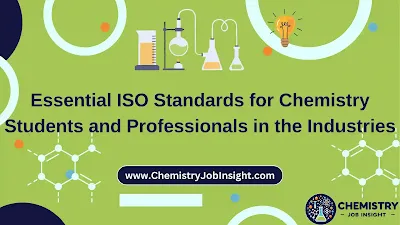Essential ISO Standards for Chemistry Students and Professionals in the Corporate World and Industries
In the corporate and industrial landscape, chemists play a pivotal role in ensuring quality, safety, and innovation in processes and products. To succeed in this environment, it’s crucial to understand and comply with specific ISO (International Organization for Standardization) standards. These standards not only enhance professional competence but also align with global regulatory and operational frameworks. Here, we delve into the most critical ISO standards relevant for chemists and chemistry students transitioning into the corporate world.
ISO 9001: Quality Management Systems
- Purpose: ISO 9001 establishes a framework for consistent quality management practices across organizations.
- Why It Matters: For chemists, this standard ensures that lab processes, research, and production meet high-quality standards. It also improves customer satisfaction by delivering reliable results.
- Example Application: Developing standard operating procedures (SOPs) for lab testing and ensuring proper documentation of research findings.
ISO 14001: Environmental Management Systems
- Purpose: This standard focuses on managing environmental responsibilities to reduce ecological impact.
- Why It Matters: Chemists often work with hazardous chemicals. Compliance with ISO 14001 helps ensure proper waste management, pollution control, and sustainable practices.
- Example Application: Implementing eco-friendly chemical processes and reducing waste in production facilities.
ISO 45001: Occupational Health and Safety Management Systems
- Purpose: ISO 45001 prioritizes creating a safe workplace and minimizing risks.
- Why It Matters: Chemists frequently handle hazardous materials and operate in potentially dangerous environments. This standard ensures their safety and well-being.
- Example Application: Developing safety protocols for handling corrosive chemicals or operating high-temperature equipment.
ISO 17025: Testing and Calibration Laboratories
- Purpose: Ensures the competence and reliability of testing and calibration laboratories.
- Why It Matters: This is essential for chemists involved in quality control, research, or regulatory testing, as it ensures accurate and dependable results.
- Example Application: Standardizing lab equipment calibration and conducting audits to maintain accuracy in analytical testing.
- Read more about ISO 17025
ISO 50001: Energy Management Systems
- Purpose: Promotes efficient energy use and reduces energy waste.
- Why It Matters: Chemists in manufacturing settings can help optimize energy-intensive processes, saving costs and reducing environmental impact.
- Example Application: Monitoring energy consumption in chemical reactions and optimizing processes for energy efficiency.
ISO 22000: Food Safety Management Systems
- Purpose: Ensures food safety across the supply chain.
- Why It Matters: For chemists in food industries, this standard ensures that raw materials, processes, and final products are safe for consumption.
- Example Application: Testing food additives and ensuring compliance with safety regulations.
ISO 13485: Medical Devices
- Purpose: Focuses on quality management for the production of medical devices.
- Why It Matters: Chemists working in pharmaceuticals or biomedical sectors need to ensure that their processes meet regulatory standards for medical device production.
- Example Application: Conducting chemical analysis of raw materials used in medical devices.
ISO 31000: Risk Management
- Purpose: Provides guidelines for identifying and mitigating risks.
- Why It Matters: In the chemical industry, risk management is critical for maintaining safety and avoiding costly errors.
- Example Application: Assessing the risks of chemical reactions and implementing controls to minimize hazards.
ISO 28000: Supply Chain Security Management
- Purpose: Manages risks within supply chains.
- Why It Matters: For chemists involved in procurement and logistics, this standard ensures the secure handling and transportation of chemicals.
- Example Application: Tracking the shipment of hazardous materials to prevent theft or spillage.
ISO 26000: Social Responsibility
- Purpose: Guides organizations on ethical and sustainable practices.
- Why It Matters: Chemists can use this standard to ensure that their work supports environmental sustainability and ethical practices.
- Example Application: Adopting green chemistry principles to reduce the environmental footprint of chemical production.
Key Takeaways for Chemists
Understanding and implementing these ISO standards can significantly enhance your career as a chemist in the corporate world. Here are some actionable steps:
- Focus on Core Standards: Begin with ISO 9001, ISO 14001, ISO 17025, and ISO 45001 as they are foundational across industries.
- Specialize for Your Industry: Depending on your field (e.g., pharmaceuticals, food, or energy), familiarize yourself with sector-specific standards like ISO 22000 or ISO 13485.
- Continuous Learning: Stay updated on ISO certifications and attend relevant training programs to enhance your expertise.
By aligning your skills with these global standards, you’ll not only ensure compliance but also position yourself as a valuable asset in the competitive industrial landscape.

